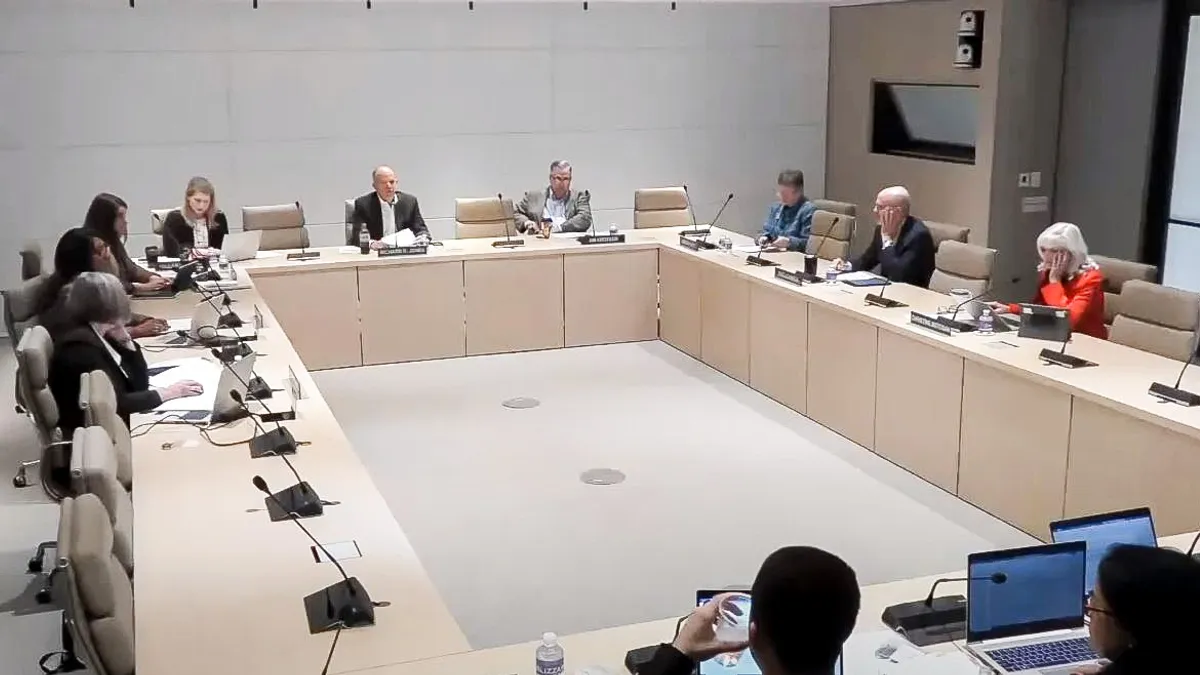When the Financial Accounting Standards Board kicked off its 50th anniversary year in January, it wasn’t well positioned for a quick victory lap.
Just two months earlier, the spectacular November 2022 collapse of Sam Bankman-Fried’s crypto exchange FTX shone a light on the dearth of existing crypto regulation. FASB did finalize new crypto rules this month, but the move was delayed in part by a decision in 2020 in which the board temporarily stepped back from the topic, deeming it not pervasive enough to tackle.
That followed on the heels of a report from the Securities and Exchange Commission’s Investor Advisory Committee that recommended a review of the FASB rule-setting process, calling out the “slow rate” at which the FASB was tackling major standards and asserting the accounting rules were both falling behind fast-changing modern business practices, and too focused on reducing preparers’ burdens rather than making financial reports more useable for investors and others.
Fast forward 12 months and the rule-making pressure persists: last week FASB Chair Richard Jones was called to a hearing on Capitol Hill where he acknowledged during questioning that the board did not have projects to define such metrics as same store sales and carbon footprints. “Well then,” quipped Rep. Brad Sherman, a Democrat from California, “you’ve got a lot of work to do.”
But as the Norwalk, Connecticut-based standard setter’s anniversary year draws to a close, there are signs that some change is taking hold: FASB is stepping up the pace and substance of its rule-setting, along with its outreach to investors and other financial report users outside of the auditing and accounting industry.
“I do feel the shift is happening,” said Kecia Williams Smith, an assistant professor of accounting at North Carolina Agricultural and Technical State University and a former associate director at the Public Company Accounting Oversight Board. “They’ve heard the critique and we’re seeing the action. We’re seeing [accounting standards updates] being proposed and moving through the standard setting process a little bit quicker so that they can be responsive to what’s happening in the marketplace.”
“Proof is in the doing”
Jones, who took his seat as FASB’s chairman in July 2020, has led a board that has shown an appetite for tackling meatier and even controversial projects, a number of which are described as “disaggregation” initiatives, meaning they will require businesses to break out more information in their reports.
Indeed, this year FASB has issued a total of nine new standards updates, compared to six in all of 2022, including one that adds specific, albeit narrow, guidance for certain crypto assets to generally accepted accounting principles as well as an update that will require companies to break out more income tax data in their financial reports.
In effect, Smith said FASB has had to refocus and reinvent itself after getting bogged down for years in a now-aborted push toward converging U.S. GAAP with international standards that largely fizzled around 2012, responding to the financial crisis and then focusing on a few large projects including revenue recognition and leases in the 2010s. In addition, a significant accounting standards update that addressed credit losses related to loans held by financial institutions and other organizations was issued in 2016, according to a FASB spokesperson.
“There was a period where … it felt like their attention was really focused on those kinds of areas and not on what was happening in the greater business environment,” Smith said, adding that that has shifted with the latest board intentionally making greater efforts to reach out to investors and academics.
Over the past 12 months, Smith said she’s seen the FASB act on some of the suggestions of the Investor Advisory Committee: for example, this year the FASB made the codification that houses GAAP free to all users, which opens up research. There have also been more public round tables, she said.
FASB’s shift was also noted in February by the SEC’s Chief Accountant Paul Munter who cautiously reflected on the board’s progress toward producing more timely and meaningful standards evidenced in its reprioritized agenda.
“Under current leadership, the FASB appears to have made certain notable improvements to its standard-setting process. In particular, the FASB has undertaken to scope its projects in a targeted way so that those projects might be completed in a more timely manner,” Munter said in a statement. “However, more work remains to be done — including improved collaboration across the FAF and the FASB regarding additional process improvements needed to accomplish more timely standard setting in response to investor needs…the proof is in the doing.”
Middle of the road
In spite of the challenges, FASB has shown staying power that its two predecessor standard setting bodies didn’t have.
Skepticism about the independence and industry bias of the FASB’s predecessor, the American Institute of Certified Public Accountants’s Accounting Principles Board, led to being dissolved, in part due to doubts that arose “because it was housed within a professional association of auditors,” according to “The FASB,” a book on its history and structure by Paul B. W. Miller and co-authors Paul Bahnson and Rodney Redding.
Ultimately, a report from a committee led by former SEC Commissioner Francis Wheat resulted in the creation of the FASB in 1973. Its underpinnings were designed to foster independence from politics and industry: FASB is a private, not-for-profit organization which is funded by publication sales and fees paid by public companies while being recognized by the SEC as the official accounting standard setter.
FASB’s eighth chair, Jones is a veteran of the public accounting world, having spent more than 28 years at Ernst & Young, ultimately as chief accountant and partner, according to his LinkedIn profile. He has made a concerted effort to draw out input from all stakeholders about what the FASB should focus on, spearheading a 2021 agenda consultation outreach program that identified 40 topics for improvement and evidenced a 300% increase in investor participation since the prior outreach five years earlier.
In a November interview, Jones rejected criticism that standards are outdated and stuck in the 20th century, a gap that some say has emerged as the economy has shifted to being service and technology-driven and away from manufacturing. Jones agreed that business is always evolving, with change being the “one constant” but he believes the FASB is keeping up, citing the new projects it has added to its agenda and the timing of its work, which he called “fairly speedy.”
Part of Jones’ strategy for standard setting is to keep the scope of the new standards narrow so that they’re “achievable.” He likens setting rules to teaching teenagers to drive: they might at first veer erratically from one far side of the road to another, threatening to hit trees or oncoming traffic. Similarly standard setting goes more smoothly if “we go down the middle of the road,” he said. So what would running into a tree mean in the standard setting analogy? “Not finishing our standards,” he said. “I’m not sure standards that are never finished benefit anyone.”
The CFO grade
That middle-of-the-road approach is a tough balancing act that has left some investors and finance executives dissatisfied.
For instance, the 2021 letter to SEC Chair Gary Gensler penned by the Alliance of Concerned Investors — an ad hoc group that included former SEC regulators along with academics and business executives — called FASB “glacially slow” and warned the resulting flawed and outdated accounting standards at the root of the Enron and Worldcom scandals have reemerged. It said the composition of the board should be changed to ensure that the majority of members were investors and called for an independent review of the FASB.
In an interview this month, Lynn Turner, a former SEC chief accountant who signed the letter, commended FASB’s outreach effort to investors but he said little of substance has changed since the letter. For instance, new standards on how companies report information on their divisions didn’t go far enough, he said.
“People want more details on the disclosures in segments and what do they do, tell you who their chief decision maker is? Well, whoopee-doo,” Turner said, asserting that the new segment standard does not provide the information needed to use in financial models to figure out what a company is worth. “The FASB struggles to get to a standard that has the information investors are actually looking for."
Meanwhile, finance executives preparing to report the new data that will be required on segments and income tax are concerned the asks by the FASB may be going too far.
Alissa Vickery, chief accounting officer at Atlanta, Georgia-based payments company Fleetcor, said in an email that she believes the information required by new segment standards are generally already captured routinely by the company. That said, the new income tax disclosures may require the company to rethink its processes to pull the tax data that will be needed. While Vickery says FASB currently uses a “balanced approach” to standard setting, she said the continued expansion of required disclosures is running up against the growing accounting talent shortage.
“This creates inherent concern around the ability of public constituents to keep up with the demands of our auditors and the requirements of our standard setters in a quality manner, while also meeting our financial objectives and filing deadlines,” Vickery wrote.
Similarly Reed Mallek, a CFO at the Boston-based biotech startup Ratio Therapeutics, is not altogether pleased with FASB’s standards. For example, lease accounting standards under ASC 842 that recently went into effect for private companies make sense on paper, but were onerous to comply with, running by his estimate roughly 100 pages long. He’d prefer FASB write standards that are clearer and more principles based like those of the International Financial Reporting Standards.
“The stuff is overly complex,” Malleck said, awarding FASB’s rule-making efforts a grade of B minus while also expressing empathy for the constraints the board faces. “They have to go in front of Congress and explain what they’re doing for their constituents who tend to be investors who are screaming, ‘How does Tyco happen, how does WorldCom happen?’... I’m sure it’s one of those kinds of impossible jobs.”
Editor's note: This story was updated to include a comment on the the credit losses accounting standards update that was issued by FASB in 2016.






















